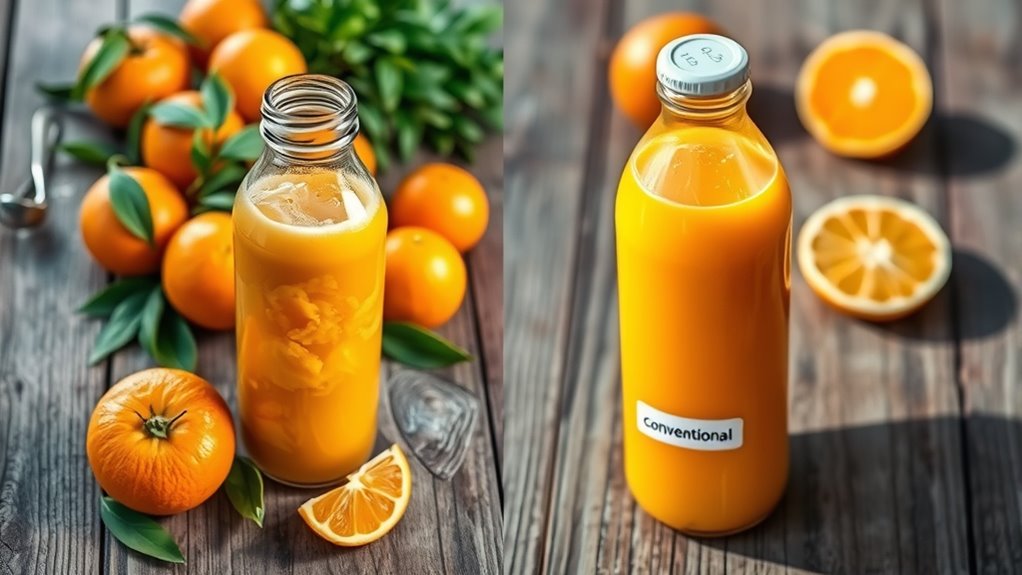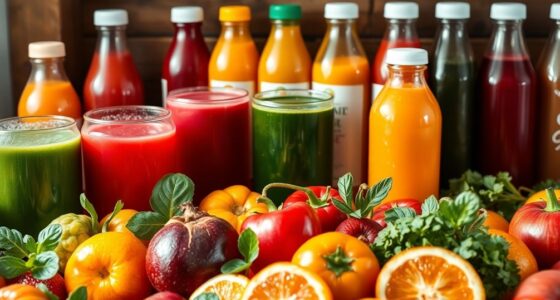When choosing between organic and conventional juice, you typically get fewer pesticide residues with organic options, as they’re made from fruits grown without synthetic chemicals. Organic juices may also have higher levels of antioxidants and vitamins, although differences can vary. Conventional juices are usually more affordable but might contain traces of pesticides. Understanding these key distinctions can help you make healthier choices; explore further to discover how farming practices truly impact your juice.
Key Takeaways
- Organic juice is made from fruits grown without synthetic pesticides or GMOs, while conventional juice may contain pesticide residues.
- Organic farming often uses natural pesticides, which are less persistent and potentially less harmful than synthetic chemicals used in conventional farming.
- Nutritional differences between organic and conventional juice are generally minimal, but organic may have higher antioxidant levels due to farming practices.
- Processing methods like pasteurization affect nutrient content regardless of organic or conventional origin, influencing overall nutritional value.
- Organic juices tend to be more expensive due to certification and farming practices, whereas conventional juices are typically more budget-friendly.

When choosing between organic and conventional juice, understanding their key differences can help you make an informed decision. One of the main concerns people have with conventional juice is the potential presence of pesticide residues. Conventional farming often relies on synthetic pesticides to protect crops from pests and diseases, which can leave traces in the fruit used for juice. While regulatory agencies set limits on pesticide residues, some consumers worry about the long-term health effects of consuming small amounts regularly. Organic juice, on the other hand, comes from fruits grown without synthetic pesticides, herbicides, or genetically modified organisms. As a result, organic juices typically contain lower levels of pesticide residues, giving you peace of mind about what’s in your glass. However, it’s important to note that organic does not always mean completely pesticide-free, as natural pesticides can sometimes be used, but they tend to be less persistent and potentially less harmful.
Beyond pesticide residues, another critical aspect to consider is nutritional content. Many believe that organic juices are more nutritious because they come from fruit that’s been grown in healthier soil, often with better farming practices. Some studies suggest that organic fruits may have higher levels of certain antioxidants and vitamins, which could translate to more nutritional benefits. However, the differences aren’t always significant and can vary depending on the fruit, season, and farming methods. Conventional juice can also pack a nutritious punch, especially if the fruit is ripe and harvested at its peak. The key is to look beyond labels and focus on the actual nutritional value, which depends more on the freshness and variety of the fruit rather than whether it’s labeled organic or conventional.
Price is another factor that often influences your choice. Organic juices tend to be more expensive due to the more labor-intensive farming practices and certification costs. If budget is a concern, conventional juice might seem more appealing, but you should weigh that against the potential exposure to pesticides and the possible nutritional differences. Additionally, processing methods can impact nutritional content; some juices are pasteurized or filtered, which can reduce certain nutrients regardless of whether they’re organic or conventional.
In the end, choosing between organic and conventional juice involves balancing concerns about pesticide residues, nutritional value, cost, and personal preferences. Both options can be part of a healthy diet if you pay attention to the quality, freshness, and sourcing of the juice. Educating yourself about these differences helps ensure you make choices that align with your health goals and values, giving you confidence in every sip.
Frequently Asked Questions
How Does Pesticide Residue Differ Between Organic and Conventional Juice?
You’ll find that pesticide residue levels are generally lower in organic juice because organic farming restricts synthetic pesticides. Residue testing often shows minimal or no detectable pesticide residues in organic options, whereas conventional juice may contain higher levels. This difference is due to stricter regulations in organic farming. So, if you’re concerned about pesticide exposure, choosing organic juice can help reduce your intake of pesticide residues.
Are Organic Juices More Affordable Than Conventional Options?
Organic juices tend to be more expensive than conventional options due to higher pricing differences driven by organic farming costs. As a consumer, you might perceive organic juices as worth the extra expense for their perceived health benefits and environmental sustainability. However, if affordability is your main concern, conventional juices often offer lower prices, making them a more budget-friendly choice. Your decision depends on balancing cost and your personal priorities.
Do Organic Juices Have a Longer Shelf Life?
Organic juices typically don’t have a longer shelf life than conventional ones. Their storage stability can be slightly lower because they often lack preservatives found in conventional juices. To maximize freshness, you should keep organic juice refrigerated and tightly sealed. Always check the expiration date, and consume it sooner if you notice any changes in taste or smell. Proper storage helps maintain its quality and safety longer.
How Do Farming Practices Impact Juice Flavor?
Farming practices directly impact juice flavor by influencing soil health and fruit ripening. Healthy soil, enriched with organic matter, promotes richer, more complex flavors in the fruit you enjoy. Additionally, sustainable practices allow fruits to ripen naturally, enhancing their sweetness and aroma. When farmers prioritize soil health and proper ripening, you get juice with deeper, more authentic flavors, making each sip more satisfying and true to the fruit’s natural taste.
Are Organic Juices More Environmentally Sustainable?
Think of organic juices as the green thumb of the industry—you’ll find they’re more environmentally sustainable. By focusing on sustainable farming techniques, they reduce chemical runoff and soil degradation. Plus, many brands use eco-friendly packaging, minimizing waste and pollution. Choosing organic supports healthier ecosystems and promotes responsible farming practices. So, yes, organic juices tend to be a better choice for the planet, helping you sip a little greener every day.
Conclusion
Choosing between organic and conventional juice depends on your priorities. Organic juice is often free from synthetic pesticides, while conventional options may be more accessible and affordable. Did you know that organic produce has been shown to contain higher antioxidant levels? So, whether you prioritize health, taste, or price, understanding these differences helps you make informed choices. Ultimately, both can fit into a healthy diet—just pick what aligns best with your lifestyle and values.









